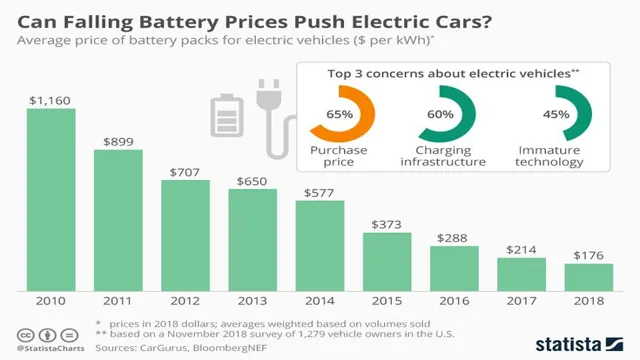Unlocking the Mystery of Electric Car Battery Life: Everything You Need to Know!
Have you ever wondered how long your electric car battery will last? As electric cars become more popular and mainstream, many people are curious about the lifespan of their batteries. Unlike traditional gasoline-powered vehicles, electric car batteries have a limited lifespan and will eventually need to be replaced. But how long do they typically last, and what factors can affect their longevity? In this blog post, we’ll explore the topic of electric car battery life expectancy in detail, examining everything from the intricacies of battery technology to the impact of driving habits on battery life.
By the end, you’ll have a better understanding of what to expect from your electric car battery and how to keep it running smoothly for years to come.
What Determines Battery Life
One of the main factors that determine battery life expectancy for electric cars is the type and quality of the battery used. Lithium-ion batteries, for example, are the most commonly used type in electric cars due to their high energy density, long cycle life, and low self-discharge rate. However, the quality of the battery cells and modules can vary greatly depending on the manufacturer and can have a big impact on overall battery performance.
Another factor is the driving habits and conditions of the driver. Aggressive driving and extreme temperatures can put additional stress on the battery and decrease its lifespan. Regular maintenance and proper charging habits can also play a role in maximizing battery life.
While the exact lifespan of an electric car battery can vary, most manufacturers offer warranties that guarantee a certain percentage of original capacity for a certain number of years or miles traveled.
Manufacturers’ warranties
When it comes to battery life, there are a number of factors that determine how long a battery will last. One of the primary factors is the quality of the battery itself. High-quality batteries, such as those from reputable brands, are often designed to last longer than lower-quality batteries.
Additionally, the specific use case for the battery can also play a role in determining its lifespan. For example, batteries that are used in high-drain applications, such as gaming laptops or electric vehicles, will typically wear out more quickly than those used in low-drain applications like remote controls or watches. Other factors that can contribute to battery life include temperature, charging practices, and overall usage patterns.
While manufacturers’ warranties may offer some peace of mind, they are not a guarantee of battery longevity. It is important to take good care of your batteries and monitor their performance over time to ensure they are functioning properly and getting the most out of their lifespan.

Battery chemistry and materials
When it comes to battery life, there are a number of factors that determine how long a battery will last before needing to be replaced. One of the most important of these factors is the battery’s chemistry and material composition. The type of material used in a battery can have a significant impact on its lifespan, with certain materials being more durable and long-lasting than others.
For example, lithium-ion batteries are known for their long lifespan and ability to hold a charge for extended periods of time. Other materials, like nickel-cadmium, are less efficient and tend to degrade more quickly over time. Additionally, the overall design and construction of a battery can also play a role in its longevity, with factors like temperature, charging cycles, and usage patterns all impacting how long a battery will last.
Ultimately, choosing the right battery for a given application requires careful consideration of all of these factors, as well as an understanding of how they interact to affect battery performance over time.
Charging habits
When it comes to our smartphone’s battery life, there are a lot of factors that determine just how long that charge will last us. One of the most significant factors is our charging habits. Charging our phones too frequently or letting them drain too much can put added stress on the battery, which reduces its lifespan.
Additionally, using third-party chargers or charging our phones in extreme temperatures can also wear down the battery faster. It’s important to develop good charging habits, such as only charging when necessary and using the original charger that came with the phone. By taking care of our batteries and using our phones efficiently, we can help ensure longer battery life and better overall phone performance.
How Long Do Electric Car Batteries Last?
When it comes to electric cars, one of the most frequently asked questions is about the battery. Many people want to know how long electric car batteries last and what their life expectancy is. Generally speaking, the battery life expectancy for electric cars is around 8-10 years, but this can vary depending on various factors such as usage, climate, and maintenance.
For instance, if you frequently fast charge your electric car, it can have a negative impact on the battery and reduce its lifespan. Similarly, if you live in an area with extreme temperatures, such as very hot or very cold climates, this can also affect the battery’s performance. Overall, it’s essential to take proper care of your electric car battery to ensure its longevity, such as avoiding excessive fast charging, charging it regularly, and keeping it at a moderate and suitable temperature.
By doing this, you can make sure your electric car battery lasts as long as possible and saves you money in the long run.
Average battery lifespan
Electric car batteries have come a long way in recent years, but one of the most common questions that consumers ask is, “How long do they last?” The answer to this question is not a straightforward one as it depends on various factors such as usage, driving environment, and maintenance. In general, electric car batteries have an expected lifespan of around 8 to 10 years, and some even last up to 15 years. The average consumer can expect to drive approximately 100,000 miles on a single battery charge before needing to replace the battery.
However, this number is also dependent on various factors such as the size of the battery, how often the vehicle is charged, and the driving habits of the owner. It is important to note that as the battery ages, its capacity to hold a charge decreases which means that it will require more frequent charging. It is a good idea to keep up with routine maintenance such as checking for leaks and ensuring proper cooling to extend the life of the battery.
Overall, the lifespan of an electric car battery can vary depending on numerous variables, but with proper care and regular maintenance, it should last for several years.
Factors that can influence battery life
How long an electric car battery lasts depends on several factors, including usage patterns, driving habits, environmental conditions, and maintenance practices. On average, electric car batteries can last anywhere from 50,000 to 200,000 miles, depending on the battery’s capacity and how well it’s maintained. However, factors such as extreme temperatures, fast and frequent charging, and aggressive driving can significantly reduce the battery’s lifespan.
It’s essential to follow the manufacturer’s recommendations for charging and maintenance, such as avoiding rapid charging and keeping the battery within a comfortable temperature range. Additionally, regular battery maintenance, such as cleaning and monitoring its state of health, can help extend its lifespan. In summary, while there’s no definitive answer to how long an electric car battery lasts, proper care and maintenance can help extend its usability and maximize its effectiveness.
Extending Battery Life
Electric cars have revolutionized the automotive industry with their eco-friendly features, low maintenance costs, and affordability. One crucial aspect that needs consideration is the battery life expectancy for electric cars. The longevity of electric car batteries is constantly evolving, which means that the latest models have better battery performance than the earlier versions.
However, several factors can affect the battery life of electric cars, such as temperature, usage patterns, and recharging habits. A good way to extend the battery life is by following best practices, such as charging it regularly and avoiding overcharging. Moreover, not letting the battery drain to zero is advisable as well.
Additionally, reducing aggressive acceleration and braking can help stretch the battery life. Ultimately, taking care of the battery of an electric car can positively impact not only its performance but also its lifespan, resulting in long-term savings.
Proper charging techniques
Proper charging techniques can significantly extend the battery life of your device. It’s essential to use the correct charger and avoid overcharging or undercharging to prevent damage to the battery. Unplugging your device once it’s charged to 100% can prevent the battery from weakening over time.
If you’re using a wireless charger, it’s crucial to ensure that your device is positioned correctly to avoid overheating and potential damage to the battery. Some devices are equipped with fast charging capabilities, but it’s vital to use this feature sparingly as it can reduce the overall lifespan of the battery. By implementing these proper charging techniques, you can ensure the longevity of your device’s battery, ultimately saving money and reducing electronic waste.
Limiting extreme temperatures
Extending battery life is crucial for any device, and one way to do that is by limiting extreme temperatures. High temperatures can degrade the performance of the battery, causing it to lose its charge quickly. On the other hand, low temperatures can also affect the battery’s performance, reducing its capacity, and causing it to drain faster.
Therefore, it’s essential to keep your device within a suitable temperature range. One useful tip is to avoid exposing your device to direct sunlight or putting it in a hot car for an extended period. Alternatively, you can use a protective case that helps to regulate the temperature and keep your battery from overheating.
By following these simple steps, you can extend your battery life and keep your device working efficiently.
Recycling and Disposing Batteries
Battery life expectancy for electric cars is a greatly debated topic within the realm of electric vehicle technology. The lifespan of a battery greatly affects the overall cost-effectiveness of an electric car, as it is one of the most expensive components. In general, most electric car batteries are expected to last between 5 to 10 years, or an average of 100,000 miles.
However, this can vary based on the brand, model, and how often the battery is used and charged. After the battery’s lifespan is over, proper recycling and disposal is crucial to prevent environmental harm. Recycling of batteries can extract valuable metals and minerals which can be repurposed, while safe disposal prevents leakage into the soil and water supply.
As electric vehicles become more popular, the industry is actively looking for ways to extend battery life and improve the sustainability of battery disposal and recycling.
Conclusion
So there you have it: the battery life expectancy of an electric car is determined by a complex set of factors, from the quality of the battery itself to the driving habits of the owner. But one thing’s for sure: with the technology advancing rapidly and companies investing more and more in sustainable transportation solutions, the future of electric cars looks brighter than ever. So go ahead, take that road trip, enjoy the ride, and don’t forget to charge up!”
FAQs
What is the average battery life expectancy for an electric car?
The average battery life expectancy for an electric car is around 8-10 years, or approximately 100,000 miles.
Can the battery life expectancy for an electric car be extended?
Yes, the battery life expectancy for an electric car can be extended through proper maintenance and charging habits, such as avoiding letting the battery drain entirely and avoiding exposing the battery to extreme temperatures.
What factors can affect the battery life expectancy for an electric car?
Factors that can affect the battery life expectancy for an electric car include temperature extremes, frequency of charging, and overall battery usage.
How much does it cost to replace the battery in an electric car?
The cost to replace the battery in an electric car varies depending on the make and model of the car, but it can range anywhere from several thousand dollars to over $10,000.






